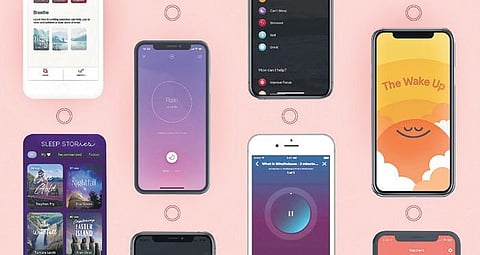

In late 2019, after Sanjana Shah gave birth to her son Vihaan, she downloaded a free app called Flo on her smartphone. “I needed to track my menstrual cycle to see how long it takes to return to normal and maintain a reliable record to discuss with my gynaecologist,” says the Mumbai-based homemaker.The 33-year-old is one among an estimated 50 million women around the world who use apps to track their monthly cycles and fertility.
“Issues like iron deficiency, polycystic ovary syndrome (PCOS), thyroid, hormonal imbalance, etc. first show up in period-related irregularities. Monitoring the menstrual cycle not only helps women track the next date of their period, but also keeps them abreast with other aspects of their health.
These apps also act as in-house support to women and couples trying to conceive or avoid pregnancy by accurately predicting the fertility window and ovulation,” says Adrit Raha, CEO of Vivant, which launched the women’s health, wellness and menstrual tracking app Nyra in 2019. But to gain any benefits, women are required to enter deeply personal and sensitive information.
Depending on the app, it could be details such as how often you have sex, if you have unprotected sex, if you are planning to get pregnant, flow dates, if you are approaching menopause or even if you suffered a recent miscarriage. “I share this information knowingly. But I don’t know what else the data is being used for or if the app is accessing other information on the phone,” Shah says.
She is right to be concerned. A 2019 examination by Consumer Reports’ Digital Lab of five popular period-tracking apps—BabyCenter, Clue, Flo, My Calendar and Ovia—revealed that there was no guarantee that the information shared by users won’t be given out to third parties. The apps routinely share some user data with external partners for targeted advertising. Those partners were then free to share or resell that personal information to third parties while making no promise on what they will do with that data. And depending on whom that information is sold to, it could have serious implications for women everywhere. It could affect life insurance coverage and the premium one pays for it, the interest rate on loans and even result in workplace discrimination. Also, since no one really knows who has access to this data, one may never find out if one has been impacted by it.
Period trackers are part of the ever-growing “femtech” market that includes technology-based products and services focused on women’s well-being. These digital tools cater to health needs via apps that offer services such as personalised nutritional advice, help with weight loss or even breast pumps that record details such as when and how much is pumped. According to Frost & Sullivan, a research and consulting firm, this market could be worth close to $50 billion by 2025. Besides tracking menstruation, period trackers can be used for a number of reasons. Professional athletes, for example, often use them to tailor their workouts or monitor their nutritional plans. Manufacturers of some apps go as far as to claim that they can help diagnose medical conditions. Flo and Clue recently introduced a tool to help the user assess her risk of PCOS.
But the medical world is divided on how accurate this information actually is. A 2017 study conducted by the University of Washington found that 20 percent of people who reviewed fertility apps said the apps incorrectly predicted their cycles.
One major reason cited was that they failed to take into account factors such as childbirth, approaching menopause, stress or even underlying health conditions that may impact menstrual cycles. The accuracy of the apps also depends on how carefully and consistently the user tracks. “Your app can be relied on to monitor your menstrual cycle and can be a useful tool if you want to get pregnant. But if you are looking to avoid it, it might not be the safest bet. Being off by a single day could result in an unintended pregnancy. Also these apps are not equipped to diagnose serious disorders such as PCOS, which impacts fertility. So, please consult your doctor to confirm any such diagnosis,” says Dr Vedia Singh, a gynaecologist. Have a happy period!
Protect your information